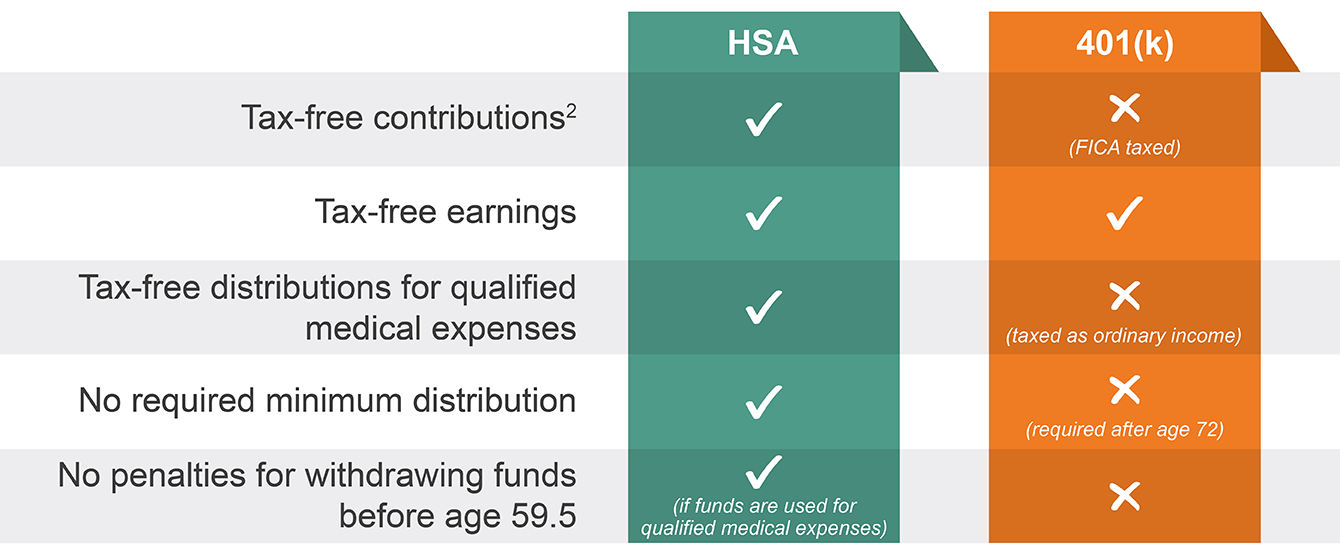HSA Retirement Planning
Most people don't think about an HSA as a savings account. Instead, they think of it as an account used to set aside money, tax free, to pay for healthcare expenses. But the reality is an HSA is much more than a health benefit account – it’s a long-term savings vehicle.
HSAs offer more tax benefits than any other retirement account, including a 401(k). How is this possible? It's simple. With an HSA, you can tap into the power of triple-tax savings1. This means contributions to your account are tax free, earnings are tax free and withdrawals for eligible healthcare expenses are tax free.
Just like with a 401(k), you can contribute to an HSA until Medicare coverage starts2. And with an HSA, you can withdraw funds for qualified medical expenses at any time, without penalty, and there are no minimum distributions, unlike a 401(k), where you’ll be taxed and penalized if you withdraw funds for any reason before age 59 ½.
HSA vs. 401(k) comparison

Retirement savings strategies
Considering the average couple can expect to spend $300,0003 on out-of-pocket healthcare costs alone during retirement, using your 401(k) as your sole retirement savings vehicle may not be ideal. Because an HSA is one of the most tax-efficient savings options available, HSA contributions have the potential to go further than 401(k) contributions, which means your HSA should be an integral part of your retirement strategy.
When you invest your HSA funds, you optimize your account even further and have an opportunity to use your account as a tool to help build a nest egg for retirement. And remember, even if you're fortunate enough to have good health and little need for healthcare-specific savings later in life, you can still access your HSA funds for other types of purchases beyond healthcare – you just have to pay ordinary income taxes on the distributions and wait until age 65 to avoid penalties.
Don’t leave money on the table by not investing
What happens if a family saves and invests their maximum annual HSA contribution over a 30-year period? Assuming an average investment return of 8%, if they do not make any withdrawals, their HSA could potentially be worth more than $895,000.
Now, let’s see how that compares to using the same contribution strategy but instead of investing those funds, they keep them in their HSA spending account.

HSA INVESTMENT SAVINGS (vs. keeping in spending account)4 = $679,309
1 Applies to federal taxation only. Contributions, investment earnings and distributions may or may not be subject to state taxation. Please consult with your tax advisor regarding your specific situation.
2 To contribute to an HSA, you must be enrolled in a qualifying high deductible health plan.
3 EBRI, https://www.ebri.org/docs/default-source/ebri-issue-brief/ebri_ib_549_savingstargets-13jan22.pdf
4 For illustrative purposes only. Savings calculations are based on an 8% rate of return and are for hypothetical purposes only.
The balance in your HSA Investment Account is subject to investment risks, including fluctuations in value and the possible loss of the principal amount invested. Investing through the WealthCare Saver investment platform is subject to the terms and conditions of the Health Savings Account Custodial Agreement and any applicable investment supplement(s). For information regarding underlying investment expenses, earnings, and distributions, see the applicable investment prospectus and other publicly available information.
WealthCare Saver, a dba of Alegeus Technologies, LLC, is a licensed Non-Bank Custodian of HSA cash accounts.
CapFinancial Partners, LLC (“CAPTRUST”) is an investment adviser registered under the Investment Advisers Act of 1940. CAPTRUST acts as investment advisor with respect to the investments available in your HSA. In addition, you may choose to have CAPTRUST manage your HSA account on a discretionary basis.
DriveWealth, LLC, a registered broker dealer and member of FINRA and SIPC. SOC 2 Type 2, GDPR, CCPA compliant. Registered in all 50 U.S. states.